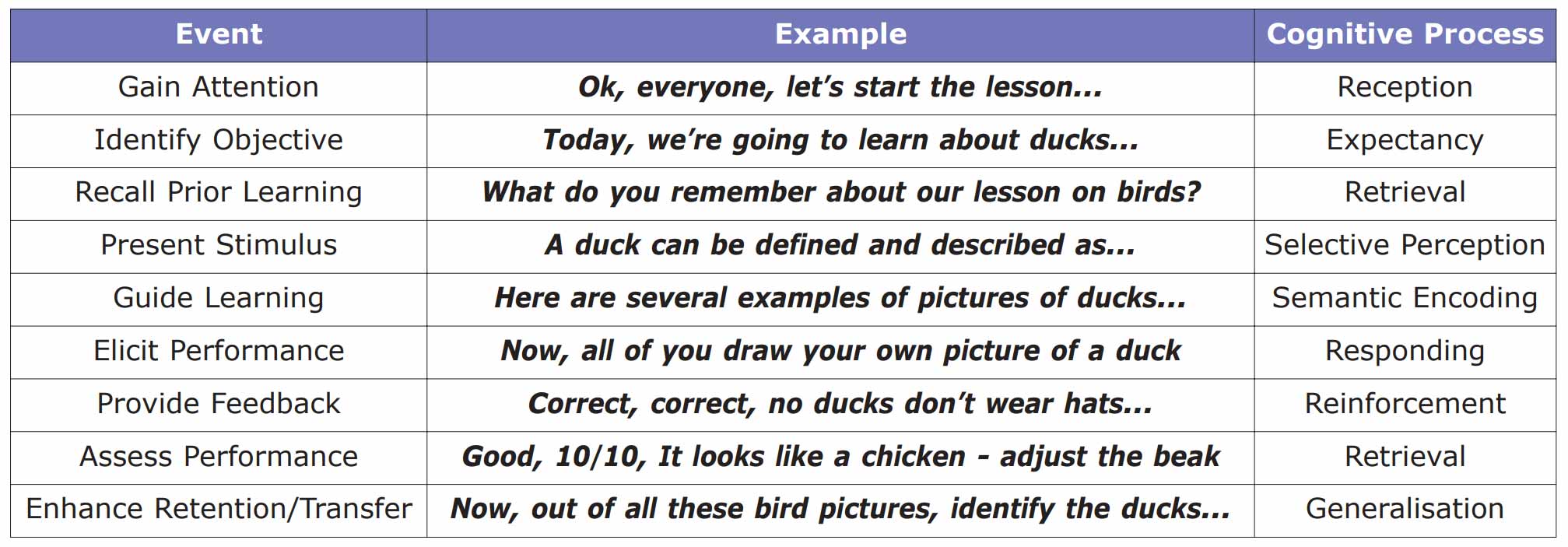Gagne’s Conditions of Learning, also known as Robert Gagne’s Nine Events of Instruction, is a set of instructional design principles developed by psychologist Robert Gagne. These conditions outline a sequence of events that enhance the learning process and promote effective instruction.
Gagne’s theory of instructional learning offers a more rounded theory of learning and instruction than other cognitive psychologists; and one which offers far more directive advice on how the teacher should manage individual lessons.
Instructional Events
The nine events provide a framework for designing and delivering instruction in a structured and systematic manner. Here is a brief explanation of each event:
- Gain Attention: This event aims to capture the learners’ attention and engage them in the learning process. It can be achieved through the use of stimulating and relevant stimuli or by posing questions or problems.
- Inform Learners of the Objective: Learners need to be aware of the specific learning objectives or goals they are expected to achieve. Clear communication of these objectives helps to focus their attention and motivate them to learn.
- Stimulate Recall of Prior Knowledge: Activating learners’ prior knowledge helps them connect new information to existing mental frameworks. By reviewing relevant concepts or experiences, learners can build upon what they already know.
- Present the Content: The instructional content is presented to the learners in a structured and organized manner. It should be logically sequenced, chunked into manageable units, and delivered using appropriate instructional strategies such as lectures, visuals, or multimedia.
- Provide Guidance: Learners need guidance and support to understand and acquire new knowledge or skills. This event involves providing clear explanations, examples, demonstrations, and instructions to assist learners in grasping the content.
- Elicit Performance: Learners are given opportunities to practice what they have learned. This active participation helps reinforce the newly acquired knowledge or skills and allows for feedback and correction if needed.
- Provide Feedback: Learners receive feedback on their performance, indicating whether they have achieved the desired learning outcomes. Feedback helps them assess their progress, identify areas for improvement, and reinforce correct understanding or behavior.
- Assess Performance: This event involves assessing learners’ performance to determine the extent to which they have achieved the learning objectives. Various assessment methods such as quizzes, tests, or practical exercises, can be used to evaluate their progress.
- Enhance Retention and Transfer: The final event focuses on promoting long-term retention and transfer of the learned material to real-world contexts. Strategies such as providing opportunities for review, application in different situations, and promoting transfer of knowledge to other domains are employed to solidify learning.
Examples

In doing this, his perspective provides a fairly straightforward recipe that allows teachers to formulate effective lessons that are likely to encourage the acquisition and recall of new concepts.
The model is, perhaps, most linked to Ausubel’s perspective; with an emphasis on the role of the teacher in carefully managing the development of new schemata.
However, it is important to note that the approach puts emphasis on student activity, and therefore avoids overtly over-emphasizing the teacher.
References
Gagne, R. (1962). Military training and principles of learning. American Psychologist, 17, 263-276.
Gagne, R. (1985). The Conditions of Learning (4th Ed.). New York: Holt, Rinehart & Winston.
Gagne, R. (1987). Instructional Technology Foundations. Hillsdale, NJ: Lawrence Erlbaum Assoc.
Gagne, R. & Driscoll, M. (1988). Essentials of Learning for Instruction (2nd Ed.). Englewood Cliffs, NJ: Prentice-Hall.
Gagne, R., Briggs, L. & Wager, W. (1992). Principles of Instructional Design (4th Ed.). Fort Worth, TX: HBJ College Publishers.

